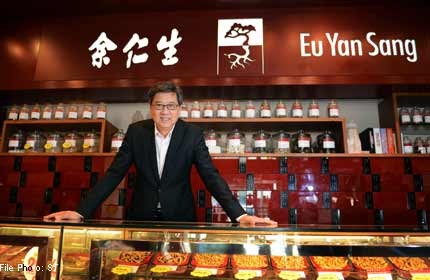An old hand on the world stage and still growing


SINGAPORE - Unlike most other Singapore companies, traditional Chinese medicine (TCM) specialist Eu Yan Sang's journey of going international had already commenced more than 100 years ago.
The business began in Perak, Malaysia, in 1879, when founder Eu Kong introduced traditional Chinese herbal remedies to nurse the health of tin mine workers who depended on opium to relieve the pain from hard working and living conditions.
He opened a medicine shop called "Yan Sang", which means "caring for mankind".
Eu Yan Sang International chief executive Richard Eu, the founder's great-grandson, explained that the pioneers of the company were already setting up overseas operations very early on.
He said: "It was way before my time. We already had operations in four places back in the 1910s and 1920s. The job was already done for me. I didn't have to do anything in order to trail-blaze and open those particular markets."
As early as 1909, Eu Yan Sang set up its first shop in Hong Kong, in the Central area.
The following year, its first Singapore store was opened in South Bridge Road.
What started with a handful of shops in Singapore, Malaysia, Hong Kong and southern China has since grown into a network of around 300 retail stores in Singapore, Malaysia, Hong Kong, Macau, China and Australia.
That is not all.
Eu Yan Sang also does wholesale distribution in several countries including the United States, Canada, Britain, New Zealand, Thailand, Indonesia and Vietnam.
Mr Eu said: "What we have done in recent years is expand the scale of our operations in the three core markets (Singapore, Malaysia and Hong Kong). More recently, in the last 10 years, we tried to go out into newer markets like China, Australia and the US with varying degrees of success."
Expanding its international presence makes a lot of business sense for Eu Yan Sang, given that the market for herbal supplements is set to grow not just in the region but also in the West.
In fact, the global herbal supplements and remedies market is forecast to reach US$113 billion (S$143.3 billion) by 2017, according to California-based Global Industry Analysts.
The industry is also expanding in non-traditional markets such as the US, where sales of herbal supplements grew more than 3 per cent in 2010, reaching more than US$5 billion.
The Asia-Pacific market, mainly driven by China and India, is set to grow the fastest among regions, at a compounded annual growth rate of 10.5 per cent through 2015.
In China alone, the size of the TCM market reached US$13 billion in 2011.
Mr Eu said: "We had to grow the business, otherwise we wouldn't survive. People are not going to come down to Chinatown just to buy from us. We had to go out to where the customers were. That's why we went to the heartland."
Eu Yan Sang's push to grow its local presence means that it now has 49 retail stores here across the island. It also had to grow its overseas presence, even extending its reach to new Western markets.
Mr Eu said: "Singapore's market is too small and the consumers' understanding of TCM and natural health care was limited until the last couple of years."
The company pursued expansion plans in Malaysia and Hong Kong from the 1990s, growing its retail stores there from just a handful to 93 in Malaysia and 56 in Hong Kong.
In 2001, it entered the US market by acquiring a retail brand - Elixir store - and its range of health tonics and teas.
In that same year, it made its maiden venture into Australia, providing integrative health clinic services under the YourHealth brand.
Last year, Eu Yan Sang completed its acquisition of the retail stores and distribution centre of ASX-listed Healthzone Limited in Australia, marking its entry into the Australian mainstream health, beauty and natural health products market.
In May, Eu Yan Sang entered into a joint venture with a mainland Chinese firm to process and export herbs.
The first phase involves setting up a 40 million yuan (S$8.2 million) plant in Sichuan province to process herbs. A trading company in Hong Kong to manage overseas sales will also be established.
Mr Eu said: "The immediate priority is China, because it is the biggest market for TCM. We've invested a few years there. The focus is to make sure that China is off to a good start."
His advice to Singapore companies hoping to go international?
"You must have deeper understanding of how the business may operate in the local markets, appreciate the local conditions and adapt accordingly. "Hiring the right talent who has deep understanding and insights of local markets is important."
alfoo@sph.com.sg

Get a copy of The Straits Times or go to straitstimes.com for more stories.